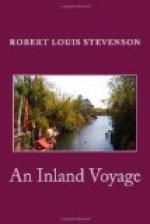There was no one to see us off but the early washerwomen—early and late—who were already beating the linen in their floating lavatory on the river. They were very merry and matutinal in their ways; plunged their arms boldly in, and seemed not to feel the shock. It would be dispiriting to me, this early beginning and first cold dabble of a most dispiriting day’s work. But I believe they would have been as unwilling to change days with us as we could be to change with them. They crowded to the door to watch us paddle away into the thin sunny mists upon the river; and shouted heartily after us till we were through the bridge.
CHANGED TIMES
There is a sense in which those mists never rose from off our journey; and from that time forth they lie very densely in my note-book. As long as the Oise was a small rural river, it took us near by people’s doors, and we could hold a conversation with natives in the riparian fields. But now that it had grown so wide, the life along shore passed us by at a distance. It was the same difference as between a great public highway and a country by-path that wanders in and out of cottage gardens. We now lay in towns, where nobody troubled us with questions; we had floated into civilised life, where people pass without salutation. In sparsely inhabited places, we make all we can of each encounter; but when it comes to a city, we keep to ourselves, and never speak unless we have trodden on a man’s toes. In these waters we were no longer strange birds, and nobody supposed we had travelled farther than from the last town. I remember, when we came into L’Isle Adam, for instance, how we met dozens of pleasure-boats outing it for the afternoon, and there was nothing to distinguish the true voyager from the amateur, except, perhaps, the filthy condition of my sail. The company in one boat actually thought they recognised me for a neighbour. Was there ever anything more wounding? All the romance had come down to that. Now, on the upper Oise, where nothing sailed as a general thing but fish, a pair of canoeists could not be thus vulgarly explained away; we were strange and picturesque intruders; and out of people’s wonder sprang a sort of light and passing intimacy all along our route. There is nothing but tit-for-tat in this world, though sometimes it be a little difficult to trace: for the scores are older than we ourselves, and there has never yet been a settling-day since things were. You get entertainment pretty much in proportion as you give. As long as we were a sort of odd wanderers, to be stared at and followed like a quack doctor or a caravan, we had no want of amusement in return; but as soon as we sank into commonplace ourselves, all whom we met were similarly disenchanted. And here is one reason of a dozen, why the world is dull to dull persons.




